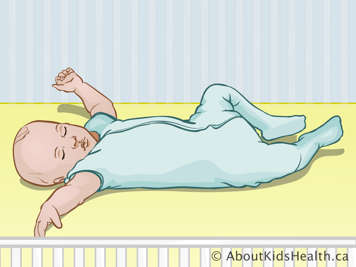Newborn babies do a lot of sleeping, about 18 hours each day. However, a newborn baby’s sleeping pattern is different from that of adults. Newborn babies spend only 20% of their sleeping time in a deep, sound sleep. The rest of the time they drift in and out of sleep, which means that by the time you put your newborn baby down and try to take a nap, they will be awake and crying again.
Some newborn babies have their days and nights mixed up: they sleep during the day and want to play at night. This is a carry-over from their days in the womb. During pregnancy, the unborn baby is most active when the mother is at rest, usually at night; they slow down when their mother is up and moving around, usually during the day. A mother’s active motions soothe the unborn baby and help them to rest. After birth, some newborn babies continue this pattern, much to the dismay of their overtired parents.
Newborn babies have shorter sleep cycles and more frequent periods of light sleep than older babies. They are prone to waking up every hour or so, and once awake, they sometimes have trouble going back to sleep. Newborn babies also need to feed, burp and have their diaper changed often. In early infancy, it does not make sense for them to sleep for long periods of time. As they grow, their sleep patterns gradually change: they will sleep for longer periods at night and have longer wake periods during the day. By about 3 months of age, many infants also develop more predictable sleep schedules and bedtimes, and clearer cues that let you know when they are tired.
Tips for making sleep time easier
Here are a few tips for making sleep time easier:
- Control the temperature: Newborn babies do not like a room that is too warm or too cold.
- Keep them moving: Movement tends to soothe newborn babies and help them to sleep. Try rocking, patting, or swaying them to music. Cuddling, rocking and soothing your baby will help them be calm and drowsy.
- Try some background noise: Background noise can be quite comforting to newborn babies. Soft music or white noise from a fan can be very soothing.
- Don’t deny the daytime naps: You may be tempted to keep your newborn baby awake during the day, even when they want to sleep, so that they will sleep "better" at night. This approach will not work, because it will make your newborn baby overtired. An overtired baby has more problems sleeping than a well-rested one. If your newborn baby is mixing up their days and nights, you can try limiting the length of their daytime naps and keeping them active when they are awake.
- When your newborn baby wakes at night for a feeding, try feeding them in a darkened room, and throughout the feeding, burping, and diaper changing, keep your talking and stimulation to a minimum. When your baby wakes for a day feeding, increase the light, conversation, and stimulation. This will help your newborn baby learn that nighttime is a sleepy time and daytime is fun time.
Safe sleep
Sudden unexpected infant death (SUID) is the sudden and unexpected death of a baby less than one year old. The vast majority of sudden infant deaths during sleep are caused by threats to breathing, such as accidental suffocation or strangulation in bed. Adopting safe sleep practices can help reduce unintentional risk to your baby. They include:
- Babies should sleep alone on their back, in a crib, cradle or bassinet that meets current safety standards and is free of soft items.
- The mattress should be firm, with a tightly fitted sheet.
- Sleep positioners, rolls, pillows or wedges are not recommended.
- Avoid overheating your baby. Well-fitting sleepwear and a thin, lightweight blanket is best.
- Keep your baby in your room, but not in the same bed for the first 6 months of life. The safest place for a baby to sleep is alone in a crib.
- Avoid having your baby sleep in a stroller, swing, bouncer, or car seat for extended periods of time.
- Make sure that all caregivers and babysitters are aware that they must put your baby to sleep on their back in their crib or bassinet.


